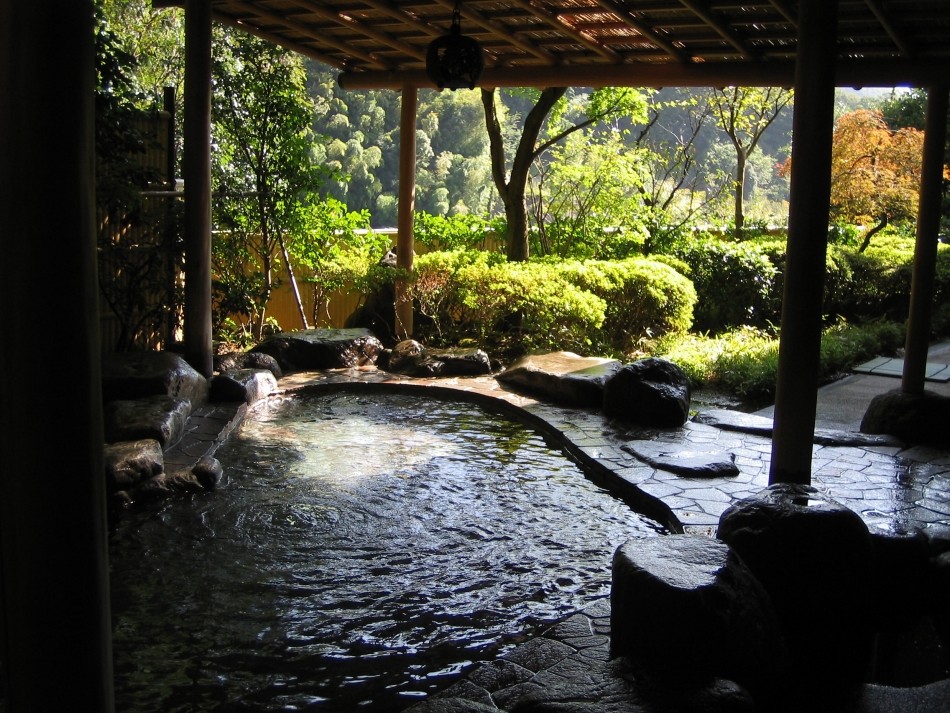Yugawara Hot Spring is one of Japan’s oldest and most famous hot spring resorts, with a history dating back over a thousand years. Located in Kanagawa Prefecture, near Hakone and Atami, it has long been known for its healing waters and scenic surroundings.

History of Yugawara Hot Spring
The Old Times
Yugawara hot spring is appeared in the Man’yōshū (Japan’s oldest poetry collection, compiled in the 8th century), indicating its significance even in ancient times. According to legend, the hot spring was discovered when an injured crane was seen healing itself in the warm waters. The area was historically believed to have medicinal properties, attracting samurai, monks, and aristocrats seeking relaxation and recovery.
Development as Hot Spring Resort
Samurai and Edo Period
During the Edo period (1603–1868), Yugawara Hot Spring gained popularity among feudal lords (daimyo) and samurai as a retreat for healing. The hot spring was thought to be beneficial for ailments like arthritis, cuts, and fatigue. The town flourished as an essential stop on the Tōkaidō road, a major route connecting Edo (Tokyo) and Kyoto.
Yugawara’s hot spring was offered to the Edo Shogunate at the time. Since ancient times, hot water has been called ‘Yakushi no Yu’, meaning ‘bath of pharmacist’, and praised for its efficacy against all illnesses. It was especially known as a hot spring that could heal wounds or burns. It was designated as a sanatorium for wounded and sick soldiers during the Sino-Japanese and Russo-Japanese wars of the Meiji era. The softness of the gypsum spring water received a good reputation. It was also called the ‘kogome no yu’; people believed water could boost women’s fertility.
Meiji to Showa Period (1868–1945)
In the late 19th and early 20th centuries, Yugawara became a retreat for literary figures, artists, and politicians. During the Taisho and early Showa periods, the area developed modern inns (ryokan) and bathhouses, further cementing its status as a resort town.
It remains known for its traditional ryokan, scenic views of Mount Fuji, and connections to the nearby Hakone region.
Benefits of the Hot Spring Water
The hot springs of Yugawara Hot Spring are renowned for their therapeutic benefits, thanks to their mineral-rich waters. The onsen is classified as a simple thermal spring, meaning it has a mild composition that is gentle on the body while providing various health benefits.
The water is slightly alkaline (pH 8.4–8.5), which helps to soften and smooth the skin by removing dead cells. It enhances skin hydration, making it ideal for dry or sensitive skin.
The water benefits people with arthritis, joint pain, or neuralgia (nerve pain). The heat and mineral composition promote blood circulation, which helps relieve fatigue.
The onsen’s soothing effect is said to reduce stress and anxiety, promoting relaxation and better sleep. The water’s minerals can also assist in post-illness recovery, especially for people with weak immune systems.
Parks
Yugawara is a beautiful and historic hot spring town known for its relaxing atmosphere. It has several parks, and these 2 parks are very popular with visitors.
1. Manyo Park 🌳
A picturesque park inspired by the ancient Manyōshū poetry collection. It has beautiful walking trails, foot baths, waterfalls, and seasonal flowers like cherry blossoms in spring and maple leaves in autumn.
The park grows more than 80 different plants and flowers. Visitors can enjoy a walk along the river, listening to its murmur, which is a relaxing experience. There is a unique footbath, S (foot bath), where you can soak your feet in hot spring water, stimulating pressure points and giving you a massage. The Kogome no Yu (day bath) is next to the park.
2. Makuyama Park 🌸
Makuyama Park is a nature-rich park along the Niizaki River, where flowers can be enjoyed all year round: plum and cherry blossoms in spring, hydrangeas in summer, sweet olives in autumn, and sasanqua in winter.
It is four thousand plum trees bloom in pink and white. The park also has great hiking trails leading to Mt. Makuyama, offering beautiful views of Sagami Bay.
The park is also open for barbecues for six months from April and has a sports facility that is ideal for families with children and dates. There is also a rock called Maku-Iwa, which is ideal for rock climbing and attracts many climbers daily.
Access: Take a bus at JR Yugawara Station and get off at Makuyama Koen bus stop. Then a 15-minute walk to the plum orchard
‘Yugawara Plum Orchard Festival’ 2025 until March 9 (Sun) https://www.youtube.com/watch?v=-nfRyjcGOgc
Other popular attractions:
1. Yugawara Art Museum 🎨
A small but elegant museum featuring works by Japanese artists inspired by Yugawara’s landscapes, including Taikan Yokoyama (https://en.wikipedia.org/wiki/Yokoyama_Taikan). It is a great place for art lovers looking for a peaceful experience.
2. Fudo Falls ⛲
A charming waterfall is hidden in the forest, only a short walk from Manyo Park! The sound of flowing water and lush green surroundings make it a peaceful spot for nature lovers.
3. Joganji Temple 🏯
This serene Buddhist temple with beautiful gardens is famous for its ancient cedar trees and historical significance. It was associated with Minamoto no Yoritomo (https://en.wikipedia.org/wiki/Minamoto_no_Yoritomo), the founder of the Kamakura Shogunate.
♨️In addition, visitors can enjoy natural hot springs at traditional ryokan or public bathhouses like Kogome-no-Yu, a well-known day-use onsen with open-air baths surrounded by nature.
Hiking Trails
1. The Makuyama Hiking Trail
The Makuyama trail is a beginner-friendly course that passes through Makuyama Park and climbs Makuyama at an altitude of 626 metres. The main attraction is the beautiful red-and-white carpet of 4,000 plum trees that bloomed in Makusan Park in February. Walking through the park, with birds chirping and the smell of plum blossoms in the air, you can feel the arrival of spring. From the top of Makuyama you can enjoy a spectacular view over the lush Sagaminada Sea and the Manazuru Peninsula. In addition to plum blossoms, Makuyama Park is also home to seasonal flowers such as rhododendrons, hydrangeas and kinky rhinoceros, making this a course that can be enjoyed in any season. Walking distance of approx. 5.0 km, walking time of 155 minutes, suitable for beginners.
The huge Maku-iwa (curtain rock) rises in the nature-rich Makuyama Park and is a popular spot for rock climbers.
2. Tenshozan Hiking Trail
This trail runs between the entrance to Okuyugawara and Tensyozan and back to Manyo Park. It is recommended for people who enjoy fresh green and autumn colours. In the autumn, the mountain is coloured with its red maple trees. The Okuyugawara area is particularly popular, where hikers can view the maple trees while listening to the quiet sounds of streams.
If hikers follow the trail path leading to the Tenshozan Shrine, they can experience such tranquillity that all they can hear is the rustling of the trees and the calls of wild birds. Hikers can also see mighty waterfalls such as Hakuun Falls and Fudo Falls. There are also day-use hot springs along the way, so you can relax after a strenuous hiking.
Must-Get Local Products
https://www.yugawara.or.jp/hiking
When visiting Yugawara, why don’t you try these local products!
- Traditional Sweet Buns 🍡, a sweet steamed bun filled with red bean paste,
- Fish cake (Kamaboko)🐟, made from pureed white fish, steamed or grilled into a firm, chewy texture
- Sweet Oranges 🍊(Japanese mandarin oranges)
- Yugawara Sake 🍶, soft, high-quality water from Yugawara’s springs, is perfect for making smooth and fragrant sake.
- Bamboo Crafts 🎍: Traditional bamboo baskets, trays, and utensils handcrafted in Yugawara.
- Onsen Cosmetics & Beauty Products💆♀️: Skincare products made with mineral-rich Yugawara hot spring water, believed to moisturize and soften the skin.
Access to Yugawara
Visiting Yugawara is easy, as it is well-connected by train and road from major cities like Tokyo or Yokohama
Here’s how you can get there:
From Tokyo:
Take the JR Tokaido Line from Tokyo Station to Yugawara Station. The trip takes around 1 hour and 15 minutes.
From Yokohama:
Take the JR Tokaido Line from Yokohama Station to Yugawara Station. The trip takes around 55 minutes.
After arriving at Yugawara
Many attractions like Manyo Park, Gosho Shrine, and Fudo Falls are within walking distance from Yugawara Station. There is also a taxi rank near JR Yugawara station.
Please refer to the Yugawara city website for more information: https://yugawara-resort.com/
Please let us know if you want information about places or things in Japan or your trip plans in Japan by email or the Contact Form on the website. We want to write about the topic in our next blog, or we could provide the information to you.
